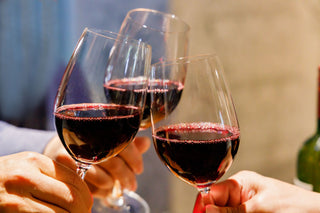Napa Valley is one of the world's most famous wine regions, and it's a great place to go wine tasting. However, if you're new to wine, sometimes it can be a little intimidating. I get that. If you are unfamiliar with some of the vocabulary being used, you may not enjoy the whole experience or you might not feel confident asking questions.
First, get out of your head and remember that it's wine. It should be fun.
Second, let me help. Here are 20 wine vocabulary words that you should know before you go wine tasting in Napa Valley:
- Varietal: A varietal is a type of grape. Some common varietals in Napa Valley include Cabernet Sauvignon, Merlot, Chardonnay, Sauvignon Blanc, and Zinfandel.
- Appellation: An appellation is a geographic region that is known for its wine production. Napa Valley is an appellation, and there are also smaller appellations within Napa Valley, such as Oakville, Rutherford, and Stags Leap District.
- Terroir: Terroir is the French term for the environmental factors that influence the flavor of wine. Terroir includes factors such as climate, soil, and topography.
- Aging: Aging is the process of storing wine in barrels or bottles for a period of time. Aging can help to develop the wine's flavor and complexity.
- Body: Body refers to the weight and texture of a wine. Wines can be light-bodied, medium-bodied, or full-bodied.
- Acidity: Acidity is a key component of wine flavor. It helps to balance the sweetness and fruitiness of a wine.
- Tannins: Tannins are compounds found in grape skins, seeds, and stems. Tannins can give wine a dry, astringent taste.
- Flavor: The flavor of wine is influenced by the varietal of grape, the appellation, the aging process, and the winemaker's style.
- Nose: The nose of wine refers to the aromas of the wine. Wines can have a variety of aromas, including fruit, flowers, herbs, and spices.
- Finish: The finish of wine refers to the lingering flavor that remains in the mouth after the wine has been swallowed.
- Balance: Balance is a key element of wine quality. A well-balanced wine has all of its components in harmony.
- Complexity: Complexity refers to the number of different flavors and aromas that can be found in a wine.
- Ageworthiness: Ageworthiness refers to the ability of a wine to improve with age. Some wines, such as Cabernet Sauvignon and Pinot Noir, are known for their ageworthiness.
- Vintage: A vintage is a year in which a wine is produced. Vintages can vary in quality due to weather conditions and other factors.
- Reserve: Reserve wines are typically made from the best grapes of the year and are aged for a longer period of time.
- Blend: A blend is a wine that is made from two or more different varietals. Blending can be used to create wines with different flavors and styles.
- Sauternes: Sauternes is a sweet wine made from grapes that have been affected by Botrytis cinerea, a fungus that concentrates the sugars in the grapes.
- Port: Port is a fortified wine that is made from grapes that have been fortified with brandy. Port is typically sweet and high in alcohol.
- Sparkling wine: Sparkling wine is wine that has been carbonated. Sparkling wines can be made from red or white grapes.
If you're new to wine tasting, just do a bit of googling before you go. Read about different varietals, appellations, and winemaking techniques. This will help you to understand the wines that you're tasting and feel more comfortable. Seriously though, don't stress over it, and have some fun!
Bonus tips for wine tasting in Napa Valley:
- Start with a light-bodied wine and work your way up to heavier wines. This will help you to develop your palate and to appreciate the different flavors of the wines.
- Take your time and savor each wine. Don't rush through the tasting.
- Pay attention to the wine's color, aroma, flavor, and finish.
- Ask questions. The teams at the wineries are there to help you learn about the wines - just ask.

